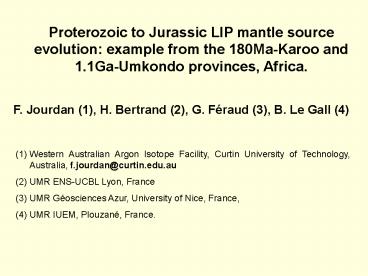Diapositive 1 - PowerPoint PPT Presentation
Title:
Diapositive 1
Description:
Diapositive 1 – PowerPoint PPT presentation
Number of Views:38
Avg rating:3.0/5.0
Title: Diapositive 1
1
Proterozoic to Jurassic LIP mantle source
evolution example from the 180Ma-Karoo and
1.1Ga-Umkondo provinces, Africa.
F. Jourdan (1), H. Bertrand (2), G. Féraud (3),
B. Le Gall (4)
- Western Australian Argon Isotope Facility, Curtin
University of Technology, Australia,
f.jourdan_at_curtin.edu.au - UMR ENS-UCBL Lyon, France
- UMR Géosciences Azur, University of Nice, France,
- UMR IUEM, Plouzané, France.
2
Major Phanerozoic LIPs (CFBs)
200 Ma
510 Ma
(182 Ma)
3
Two large igneous provinces in Southern Africa
- The 182 Ma Karoo province
- Lower Jurassic (185 177 Ma)
- Synchronous w/ Karoo-Ferar in Antarctica
- Extension gt 3.106 km2
- Related to the Africa-Antarctica breakup (opening
of the South Ocean) - High- Low-Ti basalts
- Giant dyke swarms
Jourdan et al., 2007
4
Two large igneous provinces in Southern Africa
- The 1.1 Ga Umkondo province
- Late Neoproterozoic (1108 3 Ma )
- Extension 2.106 km2
- 1 giant dyke swarms (perhaps 3-4?) minor dyke
swarms - During assembly of Rodinia
- Low-Ti province
- Late Neoproterozoic (1108 3 Ma )
- Extension 2.106 km2
- 1 giant dyke swarms (perhaps 3-4?) minor dyke
swarms - During assembly of Rodinia
- Low-Ti province
- Alteration (amph. sericite 2nd)
Modified after Hanson et al., 2004
5
Geochemical comparison
- Similar composition between Low-Ti Karoo and
low-Ti Umkondo - Minor differences Umkondo more enriched in SiO2
and depleted in TiO2 for a given Mg - But.
- Umkondo rocks are altered and metamorphosed
6
Geochemical comparison
- Similar composition of Low-Ti Karoo and low-Ti
Umkondo rocks - Minor differences
- Higher Rb content
- larger Nb negative anomaly
- Umkondo more enriched
- But.
- Umkondo rocks are altered and metamorphosed
7
(No Transcript)
8
Partial melting
- Low Ti - spinel bearing source (max. 80 km depth)
- Using a slightly more enriched source for Umkondo
magma. - Higher degree of melting required for Umkondo
rocks - Contrast with the Garnet-bearing high-Ti Karoo
mantle source.
9
Mantle source(s)Comparison Karoo-Umkondo/PODs
- PODs/Umkondo follow the same Lithosheric mantle
trend as Karoo basalts (low- high-Ti) - 4-5 Umkondo basalts follow an asthenospheric
trend (?) - High- low-Ti Karoo basalts have been suggested
to reflect a dominant lithospheric mantle
signature
A clear plume signature is lacking in most of
the Umkondo rocks studied to date.
Hanson et al., 2006
10
Karoo mantle sources-summary
- Karoo has a chemical composition different from
OIBs (mantle plume) - Magmas likely result from the polybaric melting
of an enriched lithospheric mantle (SCLM) - High-Ti ? melting in the garnet field (veins
sediments SCLM fluid) - Low-Ti ? melting in the spinel field (SCLM
fluid)
OIB
Griffin et al., 2003
Jourdan et al., 2007
- SCLM heterogeneous
- vertically (veins at the bottom)
- horizontally (depleted zone beneath the Limpopo)
11
Origins
- Mantle plume as the magmatic source?
- Hard to explain the similarity of chemical
compositions between the 2 LIPs if two different
plumes - Same plume source? Low probability that it hits
the same place twice and coincide with
megacontinent (Pangea, Rodinia) stage
180 Ma Karoo
1.1 Ga Umkondo
12
Origins
1.1 Ga Umkondo
180 Ma Karoo
- Same mantle source attached to southern African
continent - Melting within SCLM/upper mantle?
- Link to subduction surrounding mega continent
(Gondwanides Kibaran)? - Thermal shield effect (Pangea, Rodinia)?
- Plume as heat purveyor?
13
Fluid enrichment
1.1 Ga Umkondo
180 Ma Karoo
One of the many possible scenario
14
Conclusions
- Umkondo and Karoo provinces have similar source
likely attached to the African plate and have
undergone similar petrogenetic processes - Model needs to explain the difference between
the two provinces (e.g. Umkondo slightly more
enriched) - Eruptions temporarily coincide with
supercontinent amalgamations and subduction
processes - Next. PODs Isotopes and the gt2Ga Palaborwa dyke
swarm - Studying overlapping LIPs might be interesting to
bring more constraint to decipher mantle source
origin of LIPs































